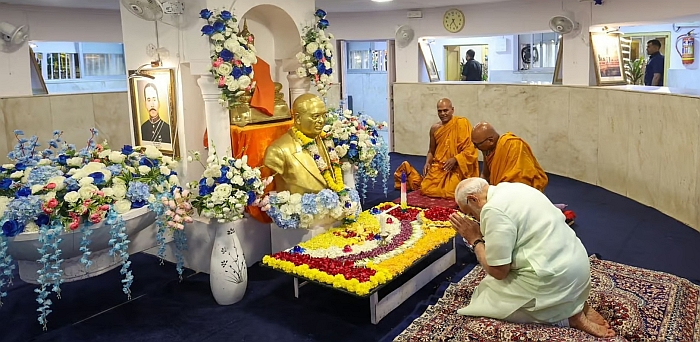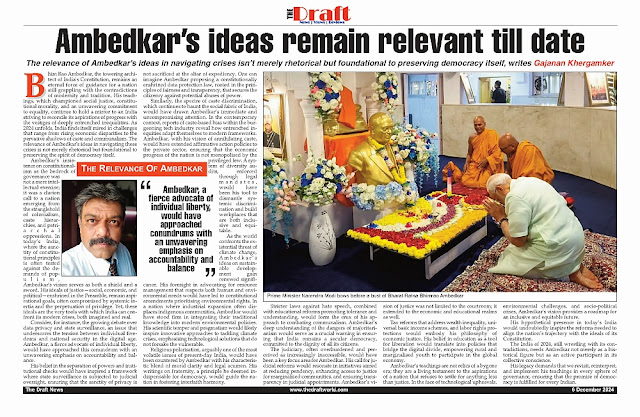Ambedkar’s Ideas Remain Relevant Till Date
The relevance of Ambedkar's ideas in navigating crises isn’t merely rhetorical but foundational to preserving democracy itself, writes Gajanan Khergamker
Bhim Rao Ambedkar, the towering architect of India's Constitution, remains an eternal force of guidance for a nation still grappling with the contradictions of modernity and tradition. His teachings, which championed social justice, constitutional morality, and an unwavering commitment to equality, continue to hold a mirror to an India striving to reconcile its aspirations of progress with the vestiges of deeply entrenched inequalities. As 2024 unfolds, India finds itself mired in challenges that range from rising economic disparities to the pervasive shadows of caste and communalism. The relevance of Ambedkar's ideas in navigating these crises is not merely rhetorical but foundational to preserving the spirit of democracy itself.
 |
| Prime Minister Narendra Modi bows before a bust of Bharat Ratna Bhimrao Ambedkar |
Ambedkar's insistence on constitutionalism as the bedrock of governance was not a mere intellectual exercise; it was a clarion call to a nation emerging from the stranglehold of colonialism, caste hierarchies, and patriarchal oppressions. In today’s India, where the sanctity of constitutional principles is often tested against the demands of populism, Ambedkar's vision serves as both a shield and a sword. His ideals of justice—social, economic, and political—enshrined in the Preamble, remain aspirational goals, often compromised by systemic inertia and the perpetuation of privilege. Yet, these ideals are the very tools with which India can confront its modern crises, both imagined and real.
Consider, for instance, the growing debate over data privacy and state surveillance, an issue that underscores the tension between individual freedoms and national security in the digital age. Ambedkar, a fierce advocate of individual liberty, would have approached this conundrum with an unwavering emphasis on accountability and balance.
His belief in the separation of powers and institutional checks would have inspired a framework where state surveillance is subjected to judicial oversight, ensuring that the sanctity of privacy is not sacrificed at the altar of expediency. One can imagine Ambedkar proposing a constitutionally enshrined data protection law, rooted in the principles of fairness and transparency, that secures the citizenry against potential abuses of power.
Similarly, the spectre of caste discrimination, which continues to haunt the social fabric of India, would have drawn Ambedkar’s immediate and uncompromising attention. In the contemporary context, reports of caste-based bias within the burgeoning tech industry reveal how entrenched inequities adapt themselves to modern frameworks. Ambedkar, with his vision of annihilating caste, would have extended affirmative action policies to the private sector, ensuring that the economic progress of the nation is not monopolised by the privileged few. A system of diversity audits, enforced through legal mandates, would have been his tool to dismantle systemic discrimination and build workplaces that are both inclusive and equitable.
As the world confronts the existential threat of climate change, Ambedkar’s ideas on sustainable development gain renewed significance. His foresight in advocating for resource management that respects both human and environmental needs would have led to constitutional amendments prioritising environmental rights. In a nation where industrial expansion often displaces indigenous communities, Ambedkar would have stood firm in integrating their traditional knowledge into modern environmental policies. His scientific temper and pragmatism would likely inspire innovative approaches to tackling climate crises, emphasising technological solutions that do not forsake the vulnerable.
Religious polarisation, arguably one of the most volatile issues of present-day India, would have been countered by Ambedkar with his characteristic blend of moral clarity and legal acumen. His writings on fraternity, a principle he deemed indispensable for democracy, would guide the nation in fostering interfaith harmony.
Stricter laws against hate speech, combined with educational reforms promoting tolerance and understanding, would form the crux of his approach to combating communalism. Ambedkar’s deep understanding of the dangers of majoritarianism would serve as a crucial warning in ensuring that India remains a secular democracy, committed to the dignity of all its citizens.
The judiciary, often overburdened and perceived as increasingly inaccessible, would have been a key focus area for Ambedkar. His call for judicial reforms would resonate in initiatives aimed at reducing pendency, enhancing access to justice for marginalised communities, and ensuring transparency in judicial appointments. Ambedkar’s vision of justice was not limited to the courtroom; it extended to the economic and educational realms as well.
Tax reforms that address wealth inequality, universal basic income schemes, and labor rights protections would embody his philosophy of economic justice. His belief in education as a tool for liberation would translate into policies that bridge the digital divide, empowering rural and marginalised youth to participate in the global economy.
Ambedkar’s teachings are not relics of a bygone era; they are a living testament to the aspirations of a nation that refuses to settle for anything less than justice. In the face of technological upheavals, environmental challenges, and socio-political crises, Ambedkar's vision provides a roadmap for an inclusive and equitable future.
His hypothetical presence in today’s India would undoubtedly inspire the reforms needed to align the nation’s trajectory with the ideals of its Constitution.
The India of 2024, still wrestling with its contradictions, needs Ambedkar not merely as a historical figure but as an active participant in its collective conscience.
His legacy demands that we revisit, reinterpret, and implement his teachings in every sphere of governance, ensuring that the promise of democracy is fulfilled for every Indian.




